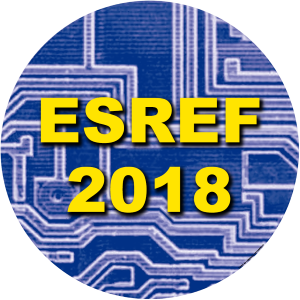Emerging challenges for a built-in reliability in innovative Automotive ICs
11:00-12:20 Session W2, Wednesday
Organizers
Alberto Macaleoni, Automotive & Discrete Group, STMicroelectronics (Italy)
| |  | | Senior Member of Technical Staff at STMicroelectronics, Automotive & Discrete Group Quality and Reliability, more than 20 years of experience in reliability assessment / research activity with main focus on physics of failure for plastic packages and chip-package interaction. |
Claudio Maria Villa, Back-end Manufacturing Technology R&D, STMicroelectronics (Italy)
| |  | | Senior Member of Technical Staff at STMicroelectronics, Back-end Manufacturing Technology R&D, he has a long time experience in thermal and thermo-mechanical aspects of IC packages, being involved in both modelling and experimental research activities. |
Matteo Medda, Automotive & Discrete Group, STMicroelectronics (Italy)
| |  | | Senior Quality Engineer at STMicroelectronics, Automotive & Discrete Group, wide experience in failure / physical analysis of smart-power ICs, quality engineering and product assurance. |
Abstract
The new automotive applications drive a faster introduction of innovative solutions in silicon design and package construction. In front of the new frontiers of integration, from system on chip to system in package combined with harsh application environment, the reliability mindset should be brought inside the product development cycles since its earliest phases. A deep focus on physics of degradation and physics of failure has become a mandatory pre-requirement to drive the correct choices on materials, process bricks, design rules, complying with an increasing variety of application and operating environment constraints. In parallel, a more accurate analysis and understanding of mission profiles is a key factor to drive a coherent evolution of qualification methodologies and standards. A future scenario may include self-diagnostic capabilities and their correlation with the actual failure process activation on the stressed unit.
Schedule/Content
- 11:00 Introduction (A. Mancaleoni / M. Medda)
- 11:05 “Use of Mission Profiles in Reliability Qualification of Microelectronics in Automotive Applications beyond AEC-Q100” (R. Rongen, NXP)
Abstract: Technologies, both in wafer technology and assembly, tend to become more complex due to higher integration, and use conditions are getting more demanding due to new application opportunities. As a consequence, specifically in automotive electronics, reliability margins are reducing and the well-established AEC-Qxx standards have to evolve to a next level. In this presentation, the relevance of understanding mission profiles and Physics of degradation to support this evolution will be discussed.
Speaker: René Rongen, Fellow at NXP Semiconductors - Corporate Quality and Reliability Engineering; wide experience in Reliability Physics and Reliability Competence management.
- 11:30 “Fast transient thermomechanical stress for lifetime estimation of sintering die attach layer on automotive packages” (M. Santopa’, ST)
Abstract: Automotive applications show a challenging trend towards higher ambient temperatures and longer lifetime requirements. In fact, more complex functionality generating more heat losses, higher integration that worsens the cooling possibilities, mounting in more exposed areas near engines, extended lifetimes for electrification of power train are taking place in automotive IRD. For this reason, Silver (Ag) sintering technology for high temperature electronics packaging is becoming a wider spread used and more reliable alternative to soft solder in high temperature and high power density applications. With the diffusion of wide band gap semiconductors (e.g., SiC), operation temperature has reached more than 200 °C; consequently, higher solder’s strength and reliability performances (longer lifetime) are required for die attach materials (solder fatigue). In this work, Ag sintering pressure-assisted layer has been investigated when submitted to fast transient thermomechanical stress (ΔT/Δt > 100 °C/min) for lifetime estimation on automotive packages.
Speaker: Marco Santopa’, Senior Reliability Engineer at STMicroelectronics, Automotive & Discrete Group, with long experience in product advanced reliability and quality management in the area of smart-power technologies and power packaging.
- 11:55 “Temperature and mechanical stress: real time in situ control and adaptive use case profiles” (CM. Villa, ST)
Abstract: The increased demand in terms of maximum temperatures and extended operative life of electronic devices driven by industrial and automotive applications is making the qualification process of standard IC’s a lengthy step with a strong impact on product costs. The approach to certify a component for whichever specified working conditions addressing all potential failure mechanisms in the product qualification phase is becoming more and more challenging. That’s to a point that it is now worth to consider real time in situ control of component quality a viable solution to put in place together with a more classical predictive approach. To make component real time in situ control feasible a clever network of sensors is needed. The speech will go through some cases of sensor integration at IC level and the correlation between sensor readings and actual failures.
Speaker: Claudio Maria Villa, Senior Member of Technical Staff at STMicroelectronics, Back-end Manufacturing Technology R&D, he has a long time experience in thermal and thermo-mechanical aspects of IC packages, being involved in both modelling and experimental research activities.
- 11:20 End of the Workshop
Who should attend?
Quality, Reliability, R&D engineers engaged in components / technology design, validation and qualification, interested in the evolution of the reliability discipline in a highly-demanding market segment.
Researchers in the field of ICs materials, technology and reliability methods, who want to be informed / updated about the automotive industry needs.




